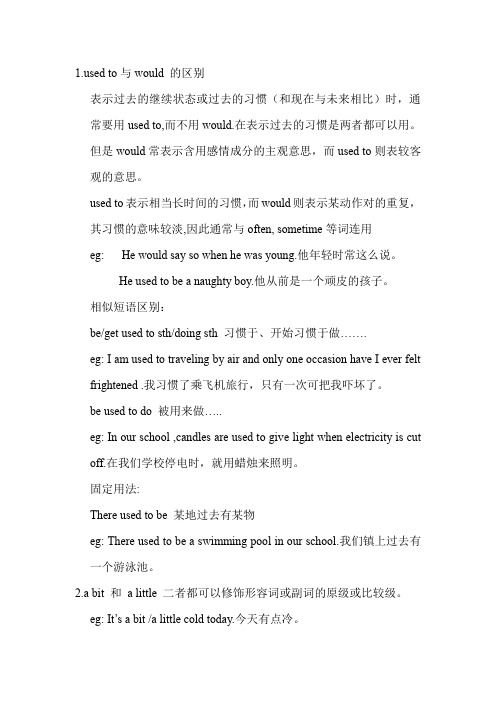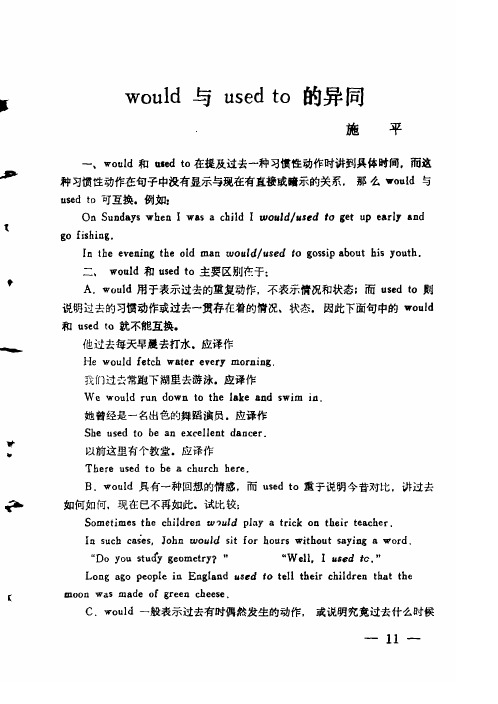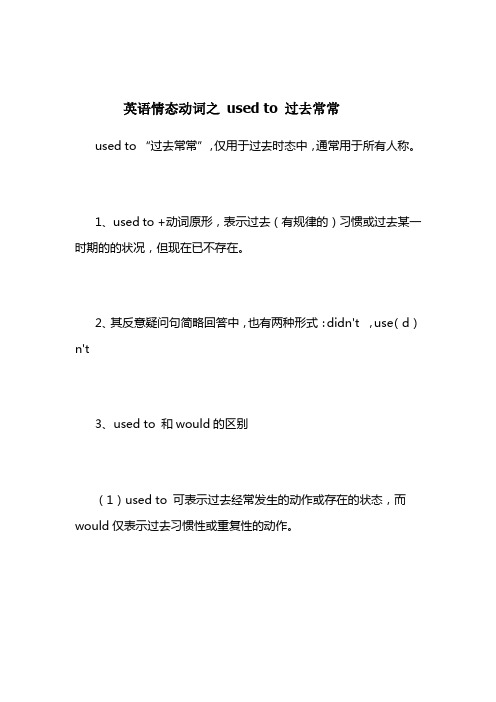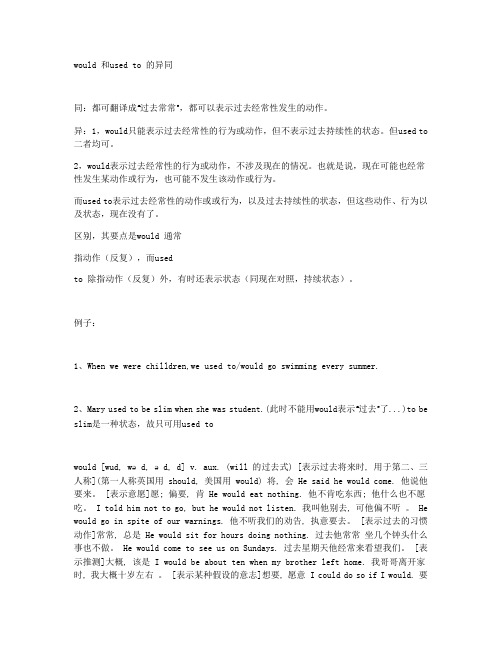would和used to
- 格式:doc
- 大小:71.00 KB
- 文档页数:5

ed to与would 的区别表示过去的继续状态或过去的习惯(和现在与未来相比)时,通常要用used to,而不用would.在表示过去的习惯是两者都可以用。
但是would常表示含用感情成分的主观意思,而used to则表较客观的意思。
used to表示相当长时间的习惯,而would则表示某动作对的重复,其习惯的意味较淡,因此通常与often, sometime等词连用eg: He would say so when he was young.他年轻时常这么说。
He used to be a naughty boy.他从前是一个顽皮的孩子。
相似短语区别:be/get used to sth/doing sth习惯于、开始习惯于做…….eg: I am used to traveling by air and only one occasion have I ever felt frightened .我习惯了乘飞机旅行,只有一次可把我吓坏了。
be used to do 被用来做…..eg: In our school ,candles are used to give light when electricity is cut off.在我们学校停电时,就用蜡烛来照明。
固定用法:There used to be 某地过去有某物eg: There used to be a swimming pool in our school.我们镇上过去有一个游泳池。
2.a bit 和a little 二者都可以修饰形容词或副词的原级或比较级。
eg: It’s a bit /a little cold today.今天有点冷。
a little可以直接加名词,而a bit必须加of后才能加名词。
eg:a little bread =a bit of bread一点儿面包a few bits of wood几片木片not a bit 意为“一点也不”相当于not at all而not at all则意为非常,表示肯定的意思。


would的用法归纳关键信息项1、 would 作为 will 的过去式,表示过去将来时举例:He said he would come the next day2、 would 用于表示过去的习惯、反复发生的动作举例:When I was a child, I would play in the park every weekend 3、 would 用于虚拟语气与现在事实相反与过去事实相反与将来事实相反4、 would 表示委婉、客气的请求、建议、意愿等举例:Would you please pass me the salt?5、 would 表示推测举例:That would be the right answer11 would 作为 will 的过去式,表示过去将来时在这种用法中,would 用于描述过去某个时间点之后将要发生的动作或存在的状态。
通常与表示过去的时间状语连用,如“yesterday”“last week”“the other day”等。
例如:She told me she would go to Beijing the next month111 与过去将来时相关的时间状语除了上述提到的常见时间状语外,还有“soon”“tomorrow”“in a few days”等,在过去的语境中使用时,需用 would 来表达将来的概念。
112 过去将来时的句式结构“主语+ would +动词原形+其他”12 would 用于表示过去的习惯、反复发生的动作这种用法强调过去经常发生但现在不再发生的动作。
例如:He would often go fishing when he lived in the countryside121 与 used to 的区别would 和 used to 都可以表示过去的习惯,但 used to 强调过去的状态或情况与现在的对比,而would 更侧重于描述过去反复发生的动作。

英语情态动词之used to 过去常常
used to “过去常常”,仅用于过去时态中,通常用于所有人称。
1、used to +动词原形,表示过去(有规律的)习惯或过去某一时期的的状况,但现在已不存在。
2、其反意疑问句简略回答中,也有两种形式:didn't ,use(d)n't
3、used to 和would的区别
(1)used to 可表示过去经常发生的动作或存在的状态,而would仅表示过去习惯性或重复性的动作。
(2)used to 强调过去的行为同现在的对比,含有“过去如此,现在已不再这样了”之意。
Would仅表示过去习惯性动作,没有预先在对比的含义。
(3)used to不能跟表确定时间短的时间状语连用。
(4)used to 可用于无人称句和存在句,而would则不可。
4、used to与be used to do和be used to doing
(1)used to表示“过去常常”隐含现在不这样了,其中to是不定式符号,后跟动词原形,仅用于过去时态。
(2)be/get/become used to 表示“习惯于”时,意为“变得习惯于“或“开始习惯于”。
(3)be used to do表示“被用来”。

would 和used to 的异同同:都可翻译成“过去常常”,都可以表示过去经常性发生的动作。
异:1,would只能表示过去经常性的行为或动作,但不表示过去持续性的状态。
但used to 二者均可。
2,would表示过去经常性的行为或动作,不涉及现在的情况。
也就是说,现在可能也经常性发生某动作或行为,也可能不发生该动作或行为。
而used to表示过去经常性的动作或或行为,以及过去持续性的状态,但这些动作、行为以及状态,现在没有了。
区别,其要点是would 通常指动作(反复),而usedto 除指动作(反复)外,有时还表示状态(同现在对照,持续状态)。
例子:1、When we were chilldren,we used to/would go swimming every summer.2、Mary used to be slim when she was student.(此时不能用would表示“过去”了...)to be slim是一种状态,故只可用used towould [wud, wəd, əd, d] v. aux. (will 的过去式) [表示过去将来时, 用于第二、三人称](第一人称英国用 should, 美国用 would) 将, 会 He said he would come. 他说他要来。
[表示意愿]愿; 偏要, 肯 He would eat nothing. 他不肯吃东西; 他什么也不愿吃。
I told him not to go, but he would not listen. 我叫他别去, 可他偏不听。
He would go in spite of our warnings. 他不听我们的劝告, 执意要去。
[表示过去的习惯动作]常常, 总是 He would sit for hours doing nothing. 过去他常常坐几个钟头什么事也不做。
He would come to see us on Sundays. 过去星期天他经常来看望我们。

would的用法一、Would的用法作为情态动词1.1 表示请求或建议"Would you like a cup of tea?"(你想喝杯茶吗?)"Would it be possible for you to help me with this project?"(你能帮我完成这个项目吗?)1.2 表示礼貌的提问"Would you mind closing the window?"(请你关上窗户好吗?)"Would you be able to lend me some money until next week?"(你可以借我一些钱到下周吗?)1.3 表示愿望或假设"I wish I would have more free time."(我希望我有更多的空闲时间。
)"If I were you, I would choose the blue dress."(如果是我,我会选择蓝色的裙子。
)二、Would与过去时态的结合使用2.1 过去经常性的动作或习惯"When I was younger, I would spend hours playing video games."(当我年轻的时候,经常花几个小时玩电子游戏。
)"We would go on family vacations every summer."(我们每个夏天都会进行家庭度假。
)2.2 叙述过去的情景或故事"The sun was setting, and the waves would crash against the shore."(太阳正在落山,海浪拍击着海岸。
)"He would always arrive late to our meetings."(他总是迟到参加我们的会议。
英语句型结构辨析:used to do sth、be used to doing sthbe used to do sth/ would的用法Ⅰ. Used to do sth.“过去常常做某事”(现在不做了),只用于过去时态。
如:①He used to get up early.过去他常早起。
(现在已不这样了)②Her mother used to go shopping on Fridays, but now she does it on Sunday.她母亲过去常在周五去购物,但现在她周日去了。
Ⅱ. Be used to (doing)sth. “习惯于做某事”,be used 是被动语态结构。
可用于现在、过去、将来多种时态。
Be可用get, become等代替。
如:①He will be / has been used to getting up early. 他将会/ 已经习惯于早起。
Ⅲ. Be used to do sth. “被用于做某事”,be used 是被动语态结构,其中不定式表目的,可用于多种时态。
如:①Wood is used to make paper.木材用来造纸。
[注]:used to 的否定式有两种:一是:used not to 二是:didn’t use to 如:①My father used not to smoke. = My father didn’t use to smoke.我爸爸过去不抽烟。
②They used not to live in the country. = They didn’t use to live in thecountry.其疑问式是将used 提前,或添加助动词did.Ⅳ.would 是情态动词,没有象used to那样,有过去和现在的对比。
不能说明是否现在还做不做。
英语中used to 用法
used to “过去常常”,仅用于过去时态中,通常用于所有人称。
1、used to +动词原形,表示过去(有规律的)习惯或过去某一时期的的状况,但现在已不存在。
2、其反意疑问句简略回答中,也有两种形式:didn't ,use (d)n't
3、used to 和would的区别
(1)used to 可表示过去经常发生的动作或存在的状态,而would仅表示过去习惯性或重复性的动作。
(2)used to 强调过去的行为同现在的对比,含有“过去如此,现在已不再这样了”之意。
Would仅表示过去习惯性动作,没有预先在对比的含义。
(3)used to不能跟表确定时间短的时间状语连用。
(4)used to 可用于无人称句和存在句,而would则不可。
4、used to与be used to do和be used to doing
(1)used to表示“过去常常”隐含现在不这样了,其中to是不定式符号,后跟动词原形,仅用于过去时态。
(2)be/get/become used to 表示“习惯于”时,意为“变得习惯于“或“开始习惯于”。
(3)be used to do表示“被用来”。
would和used to★used to和would均可用来表示过去的习惯或行为,两者多可互换。
如:We used to / would go swimming every summer when we were children。
小时候我们每年夏天都去游泳。
When we were children we used to/would go skating every winter.我们小时候每年冬天都去滑冰.★但两者在用于表示“过去习惯”时,又有如下区别:1. would只能用于表示多次重复的习惯性动作;used to既可用于表示过去的习惯性动作,也可用于表示过去的状态。
如:He is not what he used to be。
他不再是过去的那个样子了。
She used to have a Rolls Royce。
她过去拥有一辆劳斯莱斯。
2。
used to不能跟表确定的时间段的状语连用,而would却可以。
如:He would live in Beijing for twenty years.He would go to see Mother every vacation. (那时)他每个假期去看望妈妈。
He isn’t what he used to be. 他不再是过去的他。
3. used to侧重过去与现在的对比,即过去有这样的习惯而现在没有了,含有较强的“今昔对比”的含义;would无此含义,它表示反复发生的动作(如果某一动作没有反复性,就只能用used to),这种习惯可能现在还在继续。
He used to get up at six every morning。
过去他每天早上都六点起床。
(现在不这样了.)I do not swim so often as I used to。
我不像过去那样常游泳了.(不能用would代替)He would sometimes work into the night。
woulddo和usedtodo表过去习惯时到底有什么差别?would do和used to do虽然都可以表过去习惯,而且有的时候可以相互替换,但它们却存在以下几点区别:(一)would do一般用来表示过去反复进行的动作,而used to do则既可以表过去反复发生的动作,也可以表示状态。
如:1)would doEvery Saturday I would go on a longbike ride.My dad would read me amazingstories every night at bedtime.2)used to doWe used to live in New York when Iwas a kid.She used to smoke, but she gave upa few years ago.(二)would do一般没有否定表达,而used to do则肯定和否定都可以。
如:There didn't use to be a supermarketthere. When did it open?Did you use to have a garden?(三)would do所在的句子一般会先给出过去时间背景,然后才能用would do,但used to do则无需如此。
如:1)would doWhen I was a child, I would watchcartoons with my dad in the mornings.When I was a student, I would readbooks in the library every Friday.2)used to doI used to watch cartoons with my dadin the mornings, when I was a child.I used to read books in the libraryevery Friday, when I was a student.(四)would do中的do一般不能是像be、understand、feel、love 这样的静态动词。
would和used to★used to和would均可用来表示过去的习惯或行为,两者多可互换。
如:We used to / would go swimming every summer when we were children.小时候我们每年夏天都去游泳。
When we were children we used to/would go skating every winter.我们小时候每年冬天都去滑冰。
★但两者在用于表示“过去习惯”时,又有如下区别:1. would只能用于表示多次重复的习惯性动作;used to既可用于表示过去的习惯性动作,也可用于表示过去的状态。
如:He is not what he used to be. 他不再是过去的那个样子了。
She used to have a Rolls Royce. 她过去拥有一辆劳斯莱斯。
2. used to不能跟表确定的时间段的状语连用,而would却可以。
如:He would live in Beijing for twenty years.He would go to see Mother every vacation. (那时)他每个假期去看望妈妈。
He isn’t what he used to be. 他不再是过去的他。
3. used to侧重过去与现在的对比,即过去有这样的习惯而现在没有了,含有较强的“今昔对比”的含义;would无此含义, 它表示反复发生的动作(如果某一动作没有反复性,就只能用used to),这种习惯可能现在还在继续。
He used to get up at six every morning.过去他每天早上都六点起床。
(现在不这样了。
)I do not swim so often as I used to.我不像过去那样常游泳了。
(不能用would代替)He would sometimes work into the night.以前他常工作到深夜。
(不表示现在他不工作到深夜)He would get up at six every morning and had a walk in the forest then.那时候他总是六点起床,然后到森林里去散步。
(现在是否还这样不得而知。
)★used to的否定式和疑问式I used not to / usedn’t to / didn’t use to like wine, but now I’m fond of it.我过去不喜欢喝酒,现在也贪起杯了。
Used there to be a hotel on that corner? 那个拐角过去有一家旅馆吗?Did she use to live in Shanghai? 她在上海住过吗?★【即学即练】1. 用would和used to填空。
1). When working in the same office, we _______ have coffee together.2). When he was young, he _______ sleep late on Sundays, just as he does now.3). When she was sad, she _______ sit in front of that mirror doing nothing.4). She doesn’t write so often to her family as she _______.5). They _______ live near the mountain.Key: 1. used to / would 2. would 3. would / used to 4. used to 5. used to2. Translate these sentences:1). I used to be short when I was young. 我年轻时个子很矮。
2). —Did you use to have straight hair? 你过去是直发吗?—Yes, I did. 是的。
3). —Did you use to play the piano? 你过去弹钢琴吗?—No, I didn’t. 不,我不弹。
4). I used to be afraid of dark. 我过去害怕黑暗。
5). I’m terrified of the snakes. 我害怕蛇。
6). —Did you use to be afraid of being alone? 你过去害怕独自一人呆着吗?—Yes, I did. 是的,我怕。
7). I used to walk to school. 我过去走着上学。
•When I was a child, I used to like chocolate.•I used to read a lot of books but I don’t read much these days.•Liz has got short hair now but it used to be very long. Liz现在梳短发,但以前她是长发。
•They used to live in the same street as us, so we used to see them. But we don’t see them very often these days.他们过去和我们住在同一条街道,所以我们经常能看见他们,但现在我们不能经常见到他们了。
•Ann used to have a piano, but she sold it a few years ago.Ann过去有一架钢琴,但几年前她把钢琴卖了。
•When I was a child, I didn’t use to like tomatoes.当我还是个孩子时,我不喜欢西红柿。
•Where did you use to live before you came here?当你来这儿之前你住哪儿?He used to play computer games. 他过去常常玩电脑游戏。
He used to play computer games, but now he studies hard.他过去常玩电脑游戏,但是现在,他努力学习了。
get/be used to doing something;get/ be accustomed to doing something;used to do something;be used to do something/ be used for doing something;be used as①be used to 是“习惯于”某一客观事实和状态,不强调动作,to是介词,后面接名词或动名词。
如:I am used to the weather here. 我已经习惯于这里的天气了。
He is used to hard work. 他习惯于艰苦的工作。
He is used to (doing) hard work. 他习惯于(干)艰苦工作。
I am used to living here in China. 我习惯了中国的生活。
Are you used to using chopsticks? 你习惯用筷子了吗?He has got used to the new environment.②get(或become)used to指的是从不习惯到习惯这一过程的转变,另外,它往往包含着克服困难去适应的意思。
后面要接名词或名词化的动名词,表示"习惯于做某事",如:You will soon get used to the weather here. 你会习惯于这里的天气的。
In the end, I got used to doing the hard work. 最后,我终于习惯干苦活了。
③be used to 和be accustomed to区别be used to与be accustomed to的区别:前者一般用于指自然而然地成为习惯,后者常常用于指通过努力而成为习惯。
试比较:I am used to teaching English.我对教英语已习惯了。
Mrs Smith was not accustomed to leaving home during the winter.史密斯夫人不习惯冬天出门。
I am accustomed to taking coffee.我习惯了喝咖啡。
④be used for doing sth (+名词/动名词):被用于做某事...be used to do被用于做……Chopsticks are used to help us have food.筷子是用来帮助我们吃东西的。
The quilt is used to keep warm.Trees are used for making paper.The quilt is used for keeping warm.The pan can be used to cook (for cooking) eggs.这个平底锅可以用来煎鸡蛋。
A knife is used to cut bread. /A knife is used for cutting bread.⑤be used as; be used bybe used as “作为……被使用”可以和be used for doing sth.转换。
如:During the war, the castle was used as a prison / for keeping prisoners.Let’s Practice:1. Please translate these sentences into Chinese or English.Bamboo is used to make paper.The watch will be used as a birthday present to Kate.Jim is used to get up very early in the morning.I’m not used to the school life.He used to get up late.他过去常常晚起。
I never used to enjoy science, but last year I changed schools ...He used to be a soldier and join in fighting.他曾经是一名士兵并且参加过战斗。